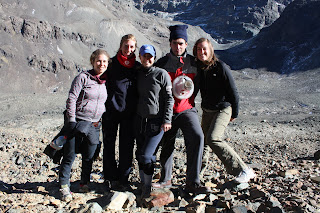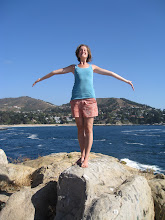I distinctly remember the terror I felt the day I walked down Octava Avenida to Residencia Entre Todas for the first time back in December of 2008, totally unsure of what to expect from the group of 25 teenage girls just waiting to eat me alive. For the first few months I worked there, I felt a small percentage of that terror every time I rounded that corner. I was intimidated by the girls, constantly relied on my co-volunteer Chris to help me understand their Chilean Spanish, and struggled with feeling useless and unwanted. These struggles, of course, made the good days and even the smallest of breakthroughs an incredible reward and motivation to continue. When Entre Todas closed, I felt in part what someone might feel after a break-up or the death of a loved one: I didn't think I'd ever want to work with a different group of kids, both because it would be incredibly difficult to start the process of building those relationships over again, but also because how could any other girls be as
bacán (Chilean slang for "cool") as my girls?
Time dissolved that feeling, of course, and I started thinking about which of the other VE partner institutions I might want to work in. Having had the opportunity to spend time at all of the institutions, I felt a bit guilty making the decision myself, choosing the group of children I preferred to work with. In the end, though, we made the decision as we would with any new volunteer, looking at both institutional needs and my skill set. Working for two years at Entre Todas made me a shoe-in for Hogar San Francisco de Régis, a home where 30 girls between the ages of 5 and 20 live and eat ice cream every day. Perfect.
It's now been about two months since I started work at San Francisco, which means I've spent eight eventful Wednesdays there. Not only does it feel important and exciting to be volunteering on a regular basis again, I'm already head over heels for the San Fran girls. There's a happier vibe overall at San Fran, and although the girls have all experienced extremely difficult circumstances in their lives, San Fran has many systems in place to make their lives as positive as possible. Like many residential homes in Chile, San Fran has both a full-time pyschologist and a full-time social worker. Among other staff members are a full-time teacher for the girls above age 11 and a part-time teacher for the girls under age 11. Study hour is actually a productive time at San Fran and it's clear to me that the girls are receiving significantly more support in this area that the girls did at Entre Todas. Another full-time staff member manages the girls' medical appointments and the girls all see a dentist regularly. There's even an aerobics/dance instructor who teaches an upbeat class twice a week for all the girls using the latest
reggaeton hits to motivate them. And finally, as I mentioned, they eat ice cream virtually every day from a soft-serve machine donated by Leonardo
Farkas, a well-known Chilean businessman and philanthropist. (He also donated two trampolines to the home but those have been long destroyed).
This doesn't mean that the girls behave perfectly by any means, in fact it's quite often the opposite. The difference with San Fran, though, is that I feel as though I have multiple people I could go to if I were really struggling with one of the girl's behavior. I've witnessed some of those difficult moments already, but my overwhelming initial feeling about San Fran is extremely positive. Perhaps I'm in the honeymoon phase of this particular brand of culture shock, but I think there's also something to be said for having operated in the VE community for so long. Not to toot the VE horn, but I feel as though I've picked up invaluable strategies and techniques for working with kids, helping kids with homework, and running a variety of workshops. Sitting down to help a girl with her homework feels like much less of a daunting task now than when I first arrived in Chile. Surprisingly, I haven't experienced much of that terror that was so prevalent for me at the beginning of my time at Entre Todas.
Above all, I'm having a lot of fun. I start each shift at San Fran by eating lunch with the staff members, who seem to truly make an effort to make the volunteers feel included. These lunches are sometimes serious and I get to hear the their thoughts on issues related to the girls and Chile's child protective services, etc.; sometimes, though, lunch is filled with gossip and off-color jokes as we serve ourselves second helpings of ice cream.
And last but not least, the girls themselves. At any given time, two of the little ones will be upside down, practicing their handstands against a wall, a table, or a near-by person. They're endlessly excitable and enthusiastic to join any workshop we introduce. The older girls hold the power in the home and have incredible influence on the younger girls. They have a clear sense of respect and justice and ensure that the younger girls respect us and the other staff members. Their love and care for the younger girls is also apparent and it seems that everyone at San Fran is invested in the well-being of everyone else.
I feel frustrated that I only see them once a week but I can tell I'm building bonds with some of the girls, slowly but surely. I had the opportunity last month to accompany a group of the girls along with Clem, another volunteer, to a heated indoor pool where Clem led us through a basic synchronized swimming lesson. On our way to the pool, I stopped for a snack because the evening snack at the home had been, of course, bread. Hand in hand with two of the girls, I explained to them about being Celiac and what that means. They seemed to feel suddenly responsible for my well-being and ushered me into a mini-market where they suggested a few snack options for me. "How about this yogurt, Tía?" one of them said. I told her it was a perfect idea and bought it. Continuing on our way, one of the girls took my hand again but then let it go and said, "You should eat your yogurt now, Tía, so it digests before we swim." She was clearly a little nervous about walking along the dark street without holding anyone's hand but wanted to show how polite she could be. "Take your time," she added, looking up at me with her killer smile.
In the two years and eight months I've been in Chile, I've gone through a number of phases, some more productive than others. I've lived in four different apartments, have run orientations for nine groups of new volunteers, and have experienced countless personal shifts and developments. Starting work with the girls at San Fran has reminded of why I came to Chile in the first place and has given me a chance to acknowledge the progress I've made, along with the goals I'm still working towards. It's easy to get caught up in the day-to-day here, but as a particularly wise 19 year-old volunteer reminded me recently, it's not about us, it's about them, the kids. Of course everything we do at VE is about the kids, but after six months without consistent direct contact at any of our institutions, I feel as though I've injected authenticity back into my experience. It's good to be a newbie!

 Our excitement at arriving at our resting place quickly faded as we noticed the cold. I can't say for sure what the temperature was that night, but I can say that I shivered the night away in multiple layers and a down sleeping bag supposedly good to 20 degrees Fahrenheit/-7 Celsius.
Our excitement at arriving at our resting place quickly faded as we noticed the cold. I can't say for sure what the temperature was that night, but I can say that I shivered the night away in multiple layers and a down sleeping bag supposedly good to 20 degrees Fahrenheit/-7 Celsius.
 The hike back down, although equally beautiful as the hike up, was a bit of a struggle as we were all pretty sore from the day before and didn't have any drinking water left. Much of the terrain was rocky, so the steady impact was rough on the joints, but we survived and made it to the parking lot, where the chlorinated Santiago water from a tap was the best thing I'd tasted in ages.
The hike back down, although equally beautiful as the hike up, was a bit of a struggle as we were all pretty sore from the day before and didn't have any drinking water left. Much of the terrain was rocky, so the steady impact was rough on the joints, but we survived and made it to the parking lot, where the chlorinated Santiago water from a tap was the best thing I'd tasted in ages.



